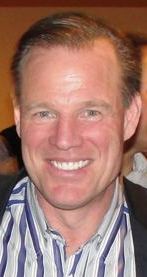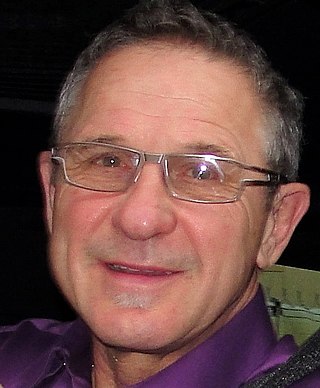
The Minnesota North Stars were a professional ice hockey team in the National Hockey League (NHL) for 26 seasons, from 1967 to 1993. The North Stars played their home games at the Met Center in Bloomington, Minnesota, and the team's colors for most of its history were green, yellow, gold and white. The North Stars played 2,062 regular season games and made the NHL playoffs 17 times, including two Stanley Cup Finals appearances, but were unable to win the Stanley Cup. After the 1992–93 season, the franchise moved to Dallas, and the team was renamed the Dallas Stars.
Kevin McCarthy is a Canadian former professional ice hockey player who spent 10 seasons in the National Hockey League between 1977 and 1987, serving as captain of the Vancouver Canucks from 1979 until 1982.
The 1990–91 NHL season was the 74th season of the National Hockey League. The Stanley Cup winners were the Pittsburgh Penguins, who won the best of seven series 4–2 against the Minnesota North Stars to claim their first championship. This was the last NHL season to end in May.
The 1980–81 NHL season was the 64th season of the National Hockey League. The Flames relocated from Atlanta to Calgary. The New York Islanders were the top regular season team and the top playoff team, winning their second consecutive Stanley Cup by defeating the Minnesota North Stars in five games.
The 1967–68 NHL season was the 51st season of the National Hockey League. The league expanded to 12 teams, putting the new six in the newly created West Division, while the "Original Six" were all placed in the newly created East Division. The regular season schedule was expanded to 74 games per team and featured the first time all twelve teams played games on the same day on October 18, 1967. The Montreal Canadiens won the Stanley Cup against the new St. Louis Blues, in four games.
The 1968–69 NHL season was the 52nd season of the National Hockey League. Twelve teams each played 76 games. For the second time in a row, the Montreal Canadiens faced the St. Louis Blues in the Stanley Cup Finals. Montreal won their second consecutive Stanley Cup as they swept the Blues in four, an identical result to the previous season.
The 1969–70 NHL season was the 53rd season of the National Hockey League. For the third straight season, the St. Louis Blues reached the Stanley Cup Finals, and for the third straight year, the winners of the expansion West Division were swept four games to none. This time, however, it was at the hands of the Boston Bruins, as the defending champions Montreal Canadiens narrowly missed the playoffs, something that did not happen again for the next quarter century. With both the Canadiens and Toronto Maple Leafs missing the 1970 Stanley Cup playoffs, it was the first time in league history that no Canadian team in the NHL qualified for the playoffs. It was also the final season that teams wore their colored jerseys at home until the 2003–04 season.
The 1970–71 NHL season was the 54th season of the National Hockey League. Two new teams, the Buffalo Sabres and Vancouver Canucks made their debuts and were both put into the East Division. The Chicago Black Hawks were moved to the West Division, and the Oakland Seals were renamed the California Golden Seals. The Montreal Canadiens won the Stanley Cup by beating the Black Hawks in seven games in the finals.
The 1973–74 NHL season was the 57th season of the National Hockey League. The Philadelphia Flyers won the Stanley Cup championship, the team's first. The team was the first of the post-1967 teams to win the Cup.
James Joseph Pappin was a Canadian professional ice hockey right winger who played 14 seasons in the National Hockey League (NHL). He played for the Toronto Maple Leafs, Chicago Black Hawks, California Golden Seals, and Cleveland Barons from 1963 to 1977. After retiring he worked as a scout for the Black Hawks, St. Louis Blues, and Anaheim Ducks, and briefly served as head coach of the Milwaukee Admirals.

Reginald Joseph Leach is a Canadian former professional ice hockey right winger who played 13 seasons in the National Hockey League (NHL) for the Boston Bruins, California Golden Seals, Philadelphia Flyers, and Detroit Red Wings between 1970 and 1983. He is best known for his time in Philadelphia, winning a Stanley Cup with the Flyers in 1975 and being a member of the LCB line.

Brian Phillip Propp is a Canadian former professional ice hockey left winger who played 15 seasons in the National Hockey League, from 1979 to 1994. He featured in five Stanley Cup Finals with three different NHL teams and won the 1987 Canada Cup with Team Canada.
Derek John Plante is an American ice hockey coach and former professional ice hockey player. Plante played eight seasons in the National Hockey League (NHL) for the Buffalo Sabres, Dallas Stars, Chicago Blackhawks and Philadelphia Flyers. He was a member of the 1999 Stanley Cup champion Dallas Stars. He was an assistant coach at the University of Minnesota-Duluth from 2010-2015 before returning to the program as associate head coach in 2020. Plante left UMD in 2022 to become an assistant coach for the Chicago Blackhawks.
Harold John Snepsts is a Canadian former professional ice hockey player who spent 17 seasons in the National Hockey League between 1975 and 1991, including two stints with the Vancouver Canucks. Snepsts featured in the 1982 Stanley Cup Finals with the Canucks.

Gilles Emile Meloche is a Canadian professional ice hockey coach, scout and former player. Meloche played as a goaltender in the National Hockey League (NHL) for the Chicago Black Hawks, California Golden Seals, Cleveland Barons, Minnesota North Stars and Pittsburgh Penguins. He is currently a special assignment scout for the Pittsburgh Penguins. Until 2013 he was the team's longtime goaltending coach, during which time the team won three Stanley Cups. Meloche was born in Montreal, Quebec.

Robert Earle Clarke is a Canadian former professional ice hockey centre who played his entire 15-year National Hockey League (NHL) career with the Philadelphia Flyers and is currently an executive with the team. Popularly known as Bobby Clarke during his playing career and as Bob Clarke since retiring as a player, Clarke is acknowledged by some as being one of the greatest hockey players and captains of all time. He was captain of the Flyers from 1973 to 1979, winning the Stanley Cup with them in both 1974 and 1975. He was again captain of the Flyers from 1982 to 1984 before retiring. A three-time Hart Trophy winner and 1987 Hockey Hall of Fame inductee, Clarke was rated number 24 on The Hockey News' list of The Top 100 NHL Players of All-Time in 1998. In 2017 Clarke was named one of the '100 Greatest NHL Players' in history.

Jean-Paul Joseph-Louis Parisé was a Canadian professional ice hockey coach and player. Parisé played in the National Hockey League (NHL), most notably for the Minnesota North Stars and the New York Islanders.
The 1967–68 St. Louis Blues season was the inaugural season in the history of the franchise. The Blues were one of the six new teams added to the NHL in the 1967 expansion. The other franchises were the Minnesota North Stars, Los Angeles Kings, Philadelphia Flyers, Pittsburgh Penguins, and California Seals. The league doubled in size from its Original Six.
Mark William Lamb is a Canadian former professional ice hockey player, and current general manager and head coach of the Prince George Cougars of the Western Hockey League (WHL). Lamb was previously the head coach of the Tucson Roadrunners of the American Hockey League (AHL) and the Swift Current Broncos of the WHL. Lamb was born in Ponteix, Saskatchewan but grew up in Swift Current, Saskatchewan. As an ice hockey player, he played for the Calgary Flames, Detroit Red Wings, Edmonton Oilers, Ottawa Senators, Philadelphia Flyers and Montreal Canadiens of the National Hockey League (NHL). He won the NHL's Stanley Cup in 1990 with the Edmonton Oilers, and co-captained the Ottawa Senators in 1993–94. Lamb also won the International Hockey League's Turner Cup with the Houston Aeros in 1999.

Patrick Maroon is an American professional ice hockey left winger for the Chicago Blackhawks of the National Hockey League (NHL). Nicknamed "Big Rig", Maroon has previously played for the Anaheim Ducks, Edmonton Oilers, New Jersey Devils, St. Louis Blues, Tampa Bay Lightning, Minnesota Wild, and Boston Bruins. Maroon is a three-time Stanley Cup champion, winning in three consecutive seasons.






